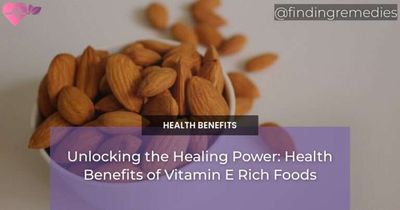Vitamin E is an antioxidant powerhouse that helps promote optimal health and well-being. Many health experts suggest that individuals should include an adequate daily intake of vitamin E rich foods in their diets, as this can help combat antioxidant deficiencies and support the body’s natural healing processes.
In this blog post, we will examine the many health benefits of vitamin E-rich foods, which include protection against a wide range of diseases, improved skin health, and enhanced immunity. We will also explore some of the top sources of vitamin E, so that you can effortlessly add them to your daily meals and snacks. With these simple tips, you can give yourself the best chance to unlock the healing power of vitamin E-rich foods, and experience continuously improved health and vitality.
Table of Contents
Overview of Vitamin E
Types of Vitamin E
Vitamin E is a group of eight fat-soluble compounds, including four tocopherols (alpha, beta, gamma, and delta) and four tocotrienols (alpha, beta, gamma, and delta). Alpha-tocopherol is the most biologically active form of vitamin E and is commonly found in supplements and fortified foods.
Nutrition Profile
Vitamin E is a powerful antioxidant that helps protect the body from damage caused by free radicals. It also plays a vital role in maintaining healthy skin, eyes, and immune function.
One serving (28 grams) of almonds, spinach, or avocado provides approximately 20% of the recommended daily allowance (RDA) of vitamin E. Other good sources of vitamin E include butternut squash, olive oil, sunflower seeds, wheat germ, pumpkin, and hazelnuts.
ALSO READ
Natural Sources
Vitamin E is found primarily in plant-based foods, such as nuts, seeds, fruits, and vegetables. However, animal-based foods, such as egg yolks and liver, also contain small amounts of vitamin E.
Health Benefits of Vitamin E
Improved Immunity
Vitamin E plays a crucial role in maintaining a healthy immune system. It helps to regulate the production of immune cells and enhances their ability to fight off infections. It also helps to reduce inflammation in the body, which can contribute to chronic diseases.
ALSO READ
Cardiovascular Health
Vitamin E has been shown to help improve cardiovascular health by reducing the risk of heart disease, stroke, and other cardiovascular conditions. It does this by reducing inflammation, preventing the oxidation of LDL (bad) cholesterol, and improving blood flow.
Cancer Prevention
Vitamin E has potent antioxidant properties that help to protect the body against cancer-causing free radicals. It also helps to boost the immune system and reduce inflammation, which can help to prevent cancer from developing.
Skin and Hair Health
Vitamin E is often used in skin and hair care products due to its anti-aging and moisturizing properties. It helps to protect the skin from damage caused by free radicals and UV radiation, and it also promotes healthy hair growth.
Eye Health
Vitamin E is essential for maintaining healthy eyesight. It helps to prevent age-related macular degeneration, cataracts, and other eye disorders by protecting the eyes from damage caused by free radicals.
Brain Health
Vitamin E plays a crucial role in maintaining brain health and preventing cognitive decline. It helps to protect the brain from oxidative stress and inflammation, which are two major contributors to age-related cognitive decline.
Cooking and Storage of Vitamin E
Effects of Cooking on Vitamin E
Cooking can cause the loss of vitamin E in foods, especially when exposed to high heat or prolonged cooking times. To minimize nutrient loss, it is best to cook foods containing vitamin E at lower temperatures for shorter periods.
Proper Storage of Vitamin E Rich Foods
To maximize the vitamin E content of foods, it is important to store them properly. Foods containing vitamin E should be kept in a cool, dry place away from direct sunlight. They should also be stored in airtight containers to prevent oxidation.
Risk Factors of Vitamin E Deficiency
Health Conditions Leading to Vitamin E Deficiency
Vitamin E deficiency is rare but can occur in individuals with certain health conditions, such as cystic fibrosis, liver disease, and Crohn’s disease. It can also occur in individuals who have had their gallbladder removed or who are unable to absorb fat properly.
Symptoms of Vitamin E Deficiency
Symptoms of vitamin E deficiency include muscle weakness, vision problems, and an increased risk of infections. In severe cases, it can lead to nerve damage and other serious health problems.
Conclusion: Pros and Cons of Vitamin E
Advantages of Vitamin E
Vitamin E is an essential nutrient that plays a vital role in maintaining overall health and well-being. It has potent antioxidant properties that help to protect the body against disease and can benefit the skin, hair, heart, brain, and immune system.
Disadvantages of Vitamin E
While vitamin E is generally safe, high doses can cause side effects, such as nausea, diarrhea, and headaches. It can also interact with certain medications, such as blood thinners and statins, so it is important to speak with a healthcare provider before taking vitamin E supplements.

